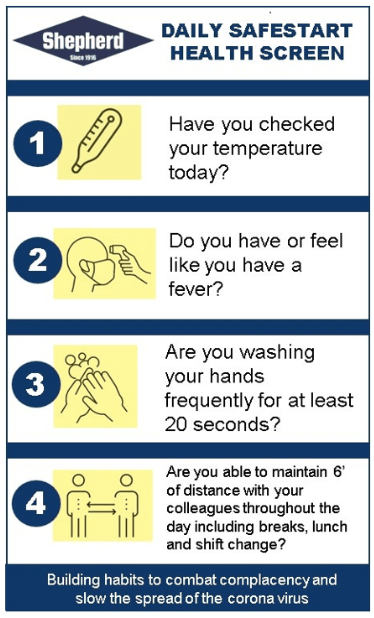SafeStart® as framework for fighting the spread of the Coronavirus
Wednesday, April 29, 2020
By Ric Towner, President & General Manager, The Shepherd Chemical Company
Like many of our partners in the chemical industry, safety is top priority at Shepherd. Since 2006 SafeStart has been a foundational element of our safety program and an essential tool in our pursuit of Shepherd’s core purpose: “To create value and brighten lives”. Two of SafeStart’s key principles are:
- Safety is a 7 day a week, 24 hour a day commitment. It is not good enough for us to only be safe at work. Most serious injuries occur outside the workplace and we want our team members and their families to flourish in all of life and to avoid serious injury anywhere.
- All human beings in all places are subject to the four states that lead to the vast majority of injuries; rushing, fatigue, frustration and complacency. We cannot engineer our facilities or our lives to eliminate these states from the human experience. We can however learn as a team to put skills in place that protect us from the errors these states often lead to: loss of balance, traction or grip, taking our eyes or minds off task, or placing ourselves in the line of fire of hazardous energy.

Since 2006, our commitment to learning and practicing the SafeStart principles has helped Shepherd to achieve an injury incidence rate that is 50% lower than the chemical industry average. We are currently putting those principles to work in our battle to slow the spread of the novel coronavirus and to help one another adopt the distancing and hygiene habits recommended by the CDC.
SafeStart principles teach us that the key error reduction technique to mitigate the state of complacency is to work on habits. The CDC has told us the habits we need to work on. The error we must avoid is clear – to keep our eyes, nose and mouth out of contact with, (or out of “the line of fire of”), the coronavirus. Our teams developed the daily SafeStart habit check list below to review with each other daily.
Monitoring our temperature, washing our hands and maintaining physical distance are becoming as second nature to us as wearing a seatbelt, wearing safety glasses and not using our phones while driving.
As we finish round 1 of our battle to slow the spread of this virus and begin to document the ongoing systemic changes to policies and procedures in our Responsible Care Management System, I am thankful for a framework like SafeStart and for the culture of individual responsibility and teamwork at Shepherd. Together they are enabling us to continue adopting the habits vital to keeping one another safe at work and at home.